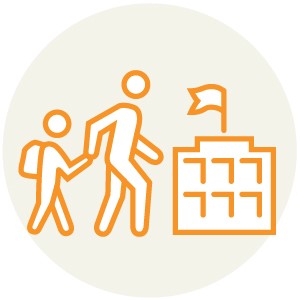Promotion, encouragement and behaviour change
On this page
Travel behaviour change initiatives
Travel behaviour change programs can include:
- household/community-based initiatives
- workplaces
- schools/education facilities
- events.
Useful resources
- Australian Transport Assessment and Planning Guidelines M5 Travel behaviour change (Commonwealth Department of Infrastructure and Regional Development, 2016)
- Gold Coast Travel Behaviour Change Plan 2017-2022 (City of Gold Coast, 2017)
- The Switch Campaign Guide and Toolbox (SWITCH Consortium (editor), 2016)
- Behaviour change (Victoria Walks, 2022)
- 10,000 Steps for Workplaces and Communities (10,000 Steps, 2022)
- 1000 Play Streets Toolkit (Play Australia, 2021)
Encouragement programs and walking groups
Walking for short trips can be an easy way to include physical activity into daily routines. Yet raising awareness of these benefits is often not enough to create walking lifestyles across our communities and at different life stages.
How we travel or choose to spend our recreational time can become habitual. A short car trip to school or the shops becomes a routine that is unlikely to change without an encouraging nudge.
Not-for-profit organisations such as 10,000 Steps and The Heart Foundation (Walking Program) can support individuals and groups to develop walking habits.
TMR endorsed guidance
- Queensland Walking Strategy 2019-2029, Encouraging more people to walk as part of their ‘everyday’, page 16 (Department of Transport and Main Roads, 2019)
Other useful resources
- Heart Foundation Walking (Heart Foundation Walking, 2022)
- 10,000 Steps (10,000 Steps, 2022)
- Case Study: 10,000 Steps (Department of Transport and Main Roads, 2020)
- Parkrun (Parkrun Australia, 2022)
- Queensland Walks Walk Hub (Queensland Walks, 2022)
Maps and walking tracks
Maps (printed, online or on mobile phone applications) are useful tools to promote walking routes and facilities.
- Maps and Walking Tracks (State of Queensland, 2022)
- Walking Maps (Victoria Walks, 2022)
- OpenStreetMap (OpenStreetMap, 2022)
Special events
Events can be large-scale or small-scale, on-street or off-street.
To run a special event in Queensland that may either directly, or indirectly, impact roads, traffic or transport arrangements, event organisers must obtain written approval from the Queensland Police Service and public authorities such as the local council or TMR.
There is an opportunity for event organisers to promote and accommodate sustainable travel (such as walking) as part of the travel options for event attendees.
TMR endorsed guidance
- Events in Queensland Handbook, Section 10 Traffic and Transport and Section 11 Accessibility (Queensland Government, 2021)
- Event Traffic Management Design Guidelines (Department of Transport and Main Roads, 2022)
Other useful resources
- Gold Coast Travel Behaviour Change Plan 2017 - 2022, Event Travel Program (City of Gold Coast, 2017)
- Last updated 13 September 2023

